There are so many wonderful ways to meditate. I’ve tried all kinds of fascinating styles. From mindfulness to guided visualizations, from mantra meditation to simply focusing on a candle—I love them all!
I didn't know the 10 Goddesses Meditation before I started researching. I knew there were powerful Hindu goddesses within the vast pantheon of yogic myth. And I knew you could invoke various goddesses into your meditation practice to invoke different intentions, sensations and outcomes.
But, what was the 10 Goddesses meditation? It sounded intriguing. And mysterious. Have I sparked your curiosity? If so, please read on!
In yogic philosophy, there’s a school that focuses on the divine faces of the mother. This spiritual feminine energy has 10 aspects each represented by a wisdom goddess known as the dasha mahavidyas.
Read: 5 Ways to Awaken Your Divine Feminine Shakti Energy
The 10 Goddesses meditation explores these faces, encouraging you to take each one into your heart as you contemplate what she represents. We’ll take a look at each goddess, and what her unique energy brings to our sacred meditation practice.
The Wisdom Goddesses
The ten mahavidyas, which represent various phases of awareness, as well as different powers of the mental body and heart space which can return us to our pure consciousness, are as follows:
Kali is one of the more popular faces of the mother. When we bring her into our meditation, we see a fiery goddess that embodies the powers to set us free from any shackle that binds us. She also represents the creation of the Universe, a real and powerful force to be reckoned with.
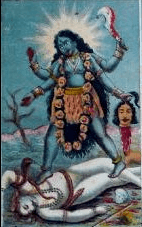
Kali invites our awareness back to the state of total unification with the divine, leaving our small, ego selves behind, and setting us free from them. Her wisdom is vast, and her energy loving but fierce.
When we meditate on Tara, we see an omnipresent, three-eyed goddess. The wisdom goddess Tara symbolizes our innate potential to become enlightened.
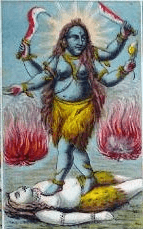
She represents the stage that comes just prior to enlightenment. Her wisdom assures us that we are spiritual beings, having a human experience and that we’re all capable of reaching this divine wisdom state of being.
3. Tripura Sundari (Sodashi)
Through meditation and contemplation, we can come to understand the message of Tripura Sundari (also known as Sodashi), which is that anything and everything that exists within the Universe is Divine.
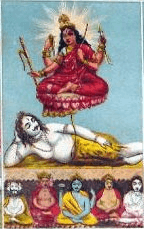
This goddess also symbolizes all that is beautiful. She is depicted as the energy that’s all good and beautiful.
4. Bhuvaneswari
This wisdom goddess’ name translates to "ruler of the Universe." When we invoke her into our meditation, she gives us the spiritual sight to recognize the Divine within everyone we meet.
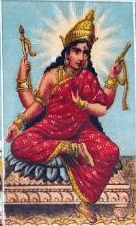
When we bow to each other at the end of a yoga class, saying, “namaste,” we’re naturally invoking this wisdom goddess.
5. Bhairavi
In invoking Bhairavi, we invoke the inner knowing of our innate kundalini power. This wisdom goddess manifests herself in a cautionary way, warning us that while we all have the potential for the divine state of consciousness, we may not realize it when it’s near because we’ve not prepared ourselves spiritually.
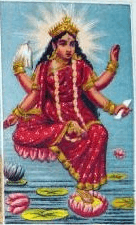
She reminds us that the spiritual path begs much preparation and discipline. Enlightenment doesn’t happen overnight.
6. Chinnamasta
In bringing Chinnamasta into our meditation, we invoke a goddess who has cut off her own head. This represents our unconditional and totally free spirit.
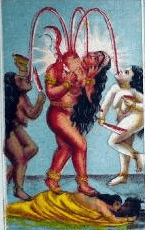
Chinnamasta’s primary message is that the power it takes to reach a divine state of consciousness resides within us all. It is in us just as our hearts are in us. And all we need to do is conjure this strength, which drives us away from our desires and towards the divine state of self-realization.
Read: Invoking the Divine Feminine in Yoga: How to Call Upon 5 Popular Hindu Goddesses
7. Dhumavati
Bringing Dhumavati into our meditation means we understand that there is darkness and negativity in the world. She’s a dark, smoky goddess reminding us of the suffering of life.

We’re reminded that it takes a lot of self-reflection, self-knowledge, and inner wisdom to understand the nature of the Universe, with its many disappointments, grievances, losses, challenges, and of course, impermanence.
Read: The Roots of Suffering: Sprouted From the Mind, Healed by the Heart
8. Bagalamukhi
When the divine mother enters our awareness wearing the face of Bagalamukhi, we bring into the meditation our ability to refuse the pull of the ego, which pulls us towards our tendencies to run to pleasure and away from pain, both of which are fleeting, of course.
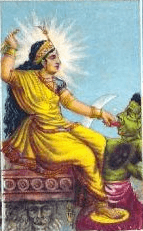
9. Matangi
Matangi’s message is one of holiness. She serves as a reminder of our innately divine consciousness that doesn’t judge but tolerates everything and everyone.
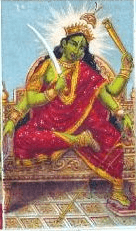
Matangi reminds us that love, compassion, and unity consciousness is our natural state. Not pride nor prejudice.
10. Kamala
In the form of Kamala, the divine goddess enters our meditative awareness to have us contemplate the fact that we should be selfless beings, and that we are naturally abundant and good. We all can meditate on our selfless nature and spiritual tendency towards divine love. That is our true nature.
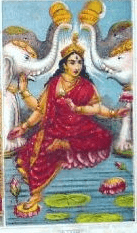
Read: 3 Tips on Improving Your Meditation Practice
If this little introduction to the 10 goddesses intrigues you, I encourage you to delve deeper into these wisdom teachings and bring them into your meditation practice. You may find that some of these goddesses resonate with you more than others.
Follow your longings and bring what you need into your sacred space of meditation.
During These Times of Stress and Uncertainty Your Doshas May Be Unbalanced.
To help you bring attention to your doshas and to identify what your predominant dosha is, we created the following quiz.
Try not to stress over every question, but simply answer based off your intuition. After all, you know yourself better than anyone else.